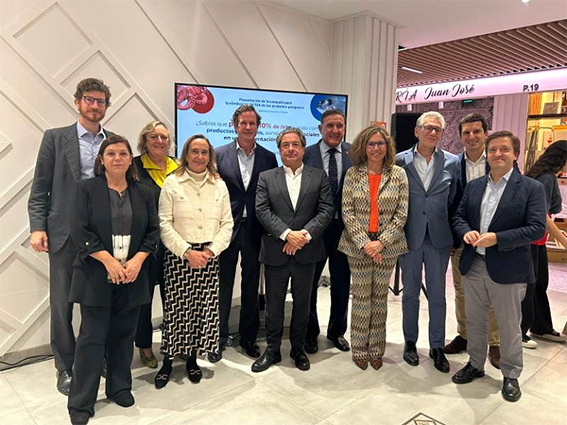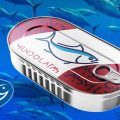ANFACO has gone a step further in its demand for the elimination or reduction of Value Added Tax (VAT) on fish products and has announced in the Madrid market of Guzmán el Bueno the launch of a campaign in more than 6,000 fishmongers throughout Spain with which it hopes to get the support of more than half a million consumers by the end of the year.
In the campaign, which will combine physical and online support, 10,000 posters and 100,000 information leaflets will be distributed in fishmongers to inform citizens about the application of a 10% VAT on their purchases of fishery products as opposed to the lower rates applied to other foods. The information to be provided explains that this is because fish products are not considered a staple food, despite the quality of the proteins they provide and the recommendation of the Spanish Agency for Food Safety and Nutrition (AESAN) to consume between three and four servings of fish a week. The brochures also delve into the health benefits derived from the intake of fish products.
Consumers will be able to support the demand for the elimination or reduction of VAT on fish from their own cell phones through the QR code that will appear on the brochures of fishmongers or by entering the web www.pescadoymariscosiniva.es. As mentioned above, the promoters of the campaign, backed by the most representative organizations of the fishing, aquaculture, processing and marketing sector in our country1, expect to achieve half a million supporters by the end of the year.
According to Luisa Álvarez, general manager of the National Federation of Provincial Associations of Fish and Frozen Products Retailers (FEDEPESCA), “The great beneficiaries of the reduction of taxes on fish products are the citizens of this country, since it would facilitate access to this protein to many more people. For this reason -adds Álvarez-, we wanted to involve consumers in this claim. We are going to test what scope we get, and depending on the results we obtain, we will decide the next step”.
It should be recalled that last week the sector again asked the Government to abolish or reduce VAT on fishery products following the decision of the Executive, as expressed by the Vice President of the Government, María Jesús Montero last June, to apply a reduced one to certain basic products of our Mediterranean diet, such as olive oil, which from January 2025 will be taxed at 4%, excluding, once again, fishery products, to which a VAT of 10% is applied.
As reported by the sector, which has requested a new meeting with President Sanchez and the ministers involved in this decision, it will require an explanation as to why the strategy that defines the nutrition and health policy of the Executive does not provide citizens with direct access to a high nutritional quality protein such as fish products, which also have “the lowest carbon footprint” of food production.
The sector recalls that the European Commission (EC) already allows the application of these healthy taxation measures in seven sectors, food being one of them. Specifically, Council Directive (EU) 2022/542 of 5 April 2022 updated the legal framework for VAT rates within the European Union (EU). This framework empowered Member States to determine tax rates, with the 0% rate being applicable to seven categories of goods and services, including, first and foremost, food, along with others such as water, medicines, medical equipment and passenger transport.
Historical claim
The reduction or elimination of VAT on fishery products in all their commercial presentations (fresh, refrigerated, frozen, canned, smoked, etc.) is a historical claim of the fishing chain, intensified in recent years as a result of its exclusion as a staple food, which has prevented it from benefiting from the measures adopted by the Executive since mid-2022 to reduce its price after the inflationary spiral caused by the invasion of Ukraine.
The sector believes that the ability of citizens to acquire healthy and essential foods for a balanced diet, as is the case of fish and seafood, should be a priority for any government, as do other European countries in our environment through the application of a healthy taxation. Thus, countries such as Ireland, Malta and the United Kingdom have a permanent zero VAT; the Government of Portugal eliminated it in April 2023 for the main fish species consumed and since the beginning of this year applies a super reduced rate of 6%; as it happens in other countries such as Germany (7%), Belgium (6%), Cyprus, Croatia, Hungary and Poland (5%), France (5.5%) and Luxembourg (3%).
Finally, the fishing chain recalls that through the application of a healthy taxation for their products would also help to alleviate the persistent fall in consumption. Thus, according to the Report on Food Consumption in Spain 2023 MAPA, per capita consumption of fishery products in households in 2023 was 18.56 kg, 3.3% less than in 2022. The year 2023 thus closes with the lowest data in volume of the entire historical series, which shows an accumulated fall of 34.3% since 2008.















